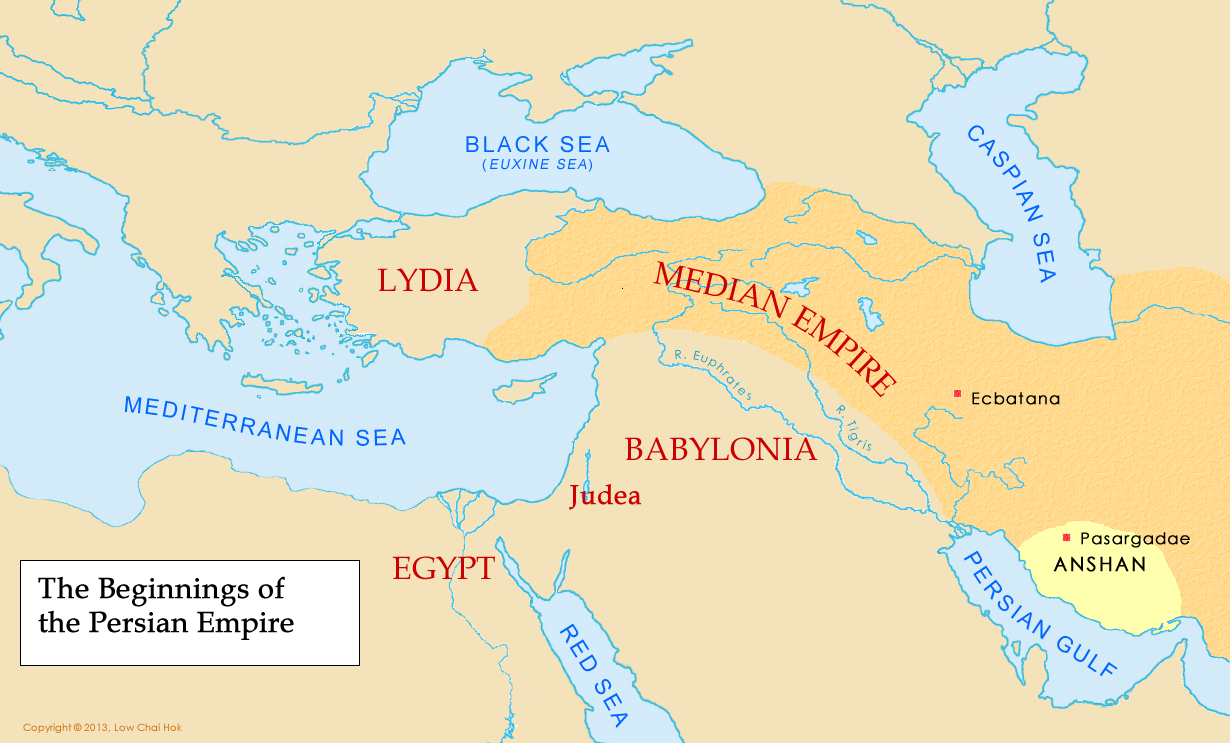The Persian Empire owes its origin to the efforts of one man � Cyrus II (the Great). We know little of him, however, or of the origins of the Persian people he led, though traditions claim his decadency from the house of Achaemenes, a Median royalty. History meets Cyrus for the first time in 559 when he inherited the kingdom of Anshan, a minor vassal of the Medes.

Now, the Medes and the Babylonians were at one time allies, and their combined forces had struck the fatal blow to the Assyrian Empire when, in 612, they attacked and brought down the Assyrian capital city of Nineveh. Though the Medes had led the initial charge on the city, they soon withdrew for reasons that still remain a mystery. Capitalizing on Assyria�s disaster, Nebuchadnezzar, the king of Babylon, then marched westward and annexed all her territory, and despite Egypt�s attempt to make trouble for Nebuchadnezzar, the tide of Babylonian victory could no longer be stamped. The subsequent political realignment of the states in the Near East strained the relationship with the Medes still further until they became a source of constant insecurity for the Babylonians. In 550 BC, however, Cyrus took on and defeated Astyages, king of the Medes.
Cyrus proved to be a generous conqueror. Though he had no qualms plundering the wealth of Ecbatana, the Median capital, he spared the city and kept it as one of his new empire. He also earned the gratitude and respect of the locals when he returned many of the former Median officials to their posts. Such largesse in a conqueror was new and it would become a characteristic of Cyrus� reign.
Inheriting all of Astyages� vast territorial possessions in one stroke, Cyrus� empire became a major power quite overnight. Such an event could not but create tremors across the surrounding nations, but no one then could have seen the deep and far-reaching cracks those tremors would cause. Gregory Dix was only over-stating the point slightly, but only slightly, when he claims that:
The tapestry of history has no point at which you can cut it and leave the design intelligible. Yet the sudden rise to Empire c.550 B.C. of Cyrus, the prince of a petty Persian tribe, is almost such a point. Herodotus saw in this event the turning point of all Greek history. That is only part of the truth. Deutero-Isaiah, who saw in Cyrus God�s Shepherd of the nations, the man whose right hand God Himself upheld, �to open the doors before him and the gates shall not be shut,� suggests a wider vision. The life�s work of this one man moulded the destiny of three great civilizations and set the main lines upon which universal history would run for more than fifteen hundred years, with consequences that are still potent today.
G. Dix, Jews and Greeks, cited in F. F. Bruce, Israel and the Nations (Exeter: Paternoster, 1973) 97.

Low Chai Hok
©Alberith, 2013

©Alberith, 2014